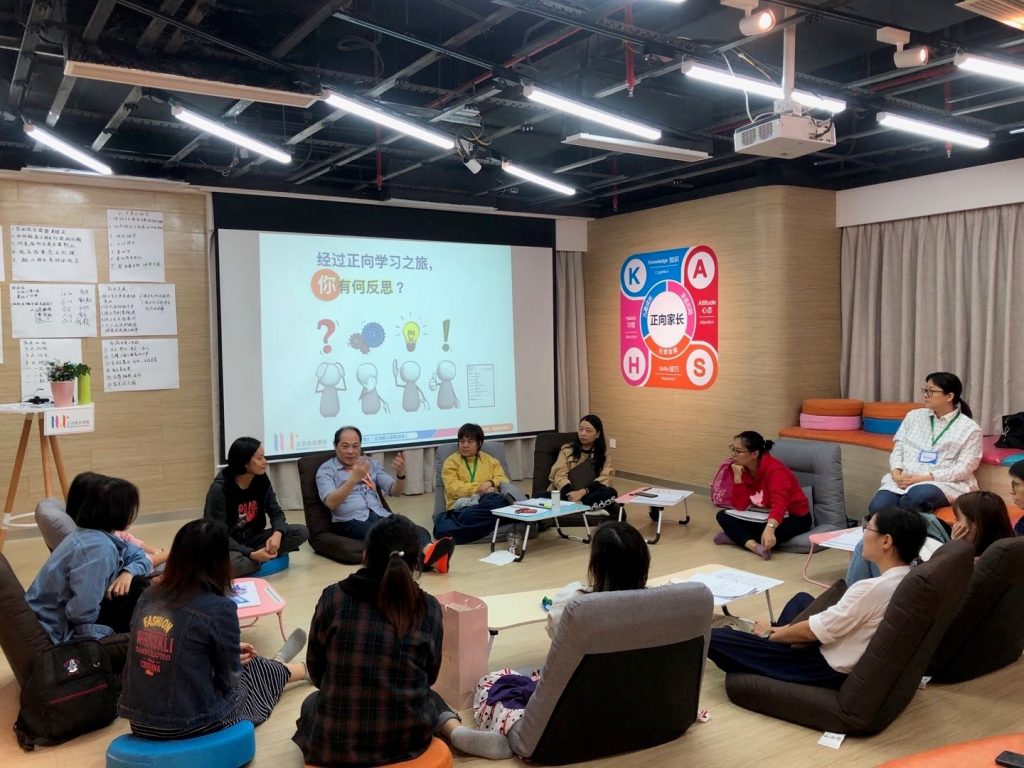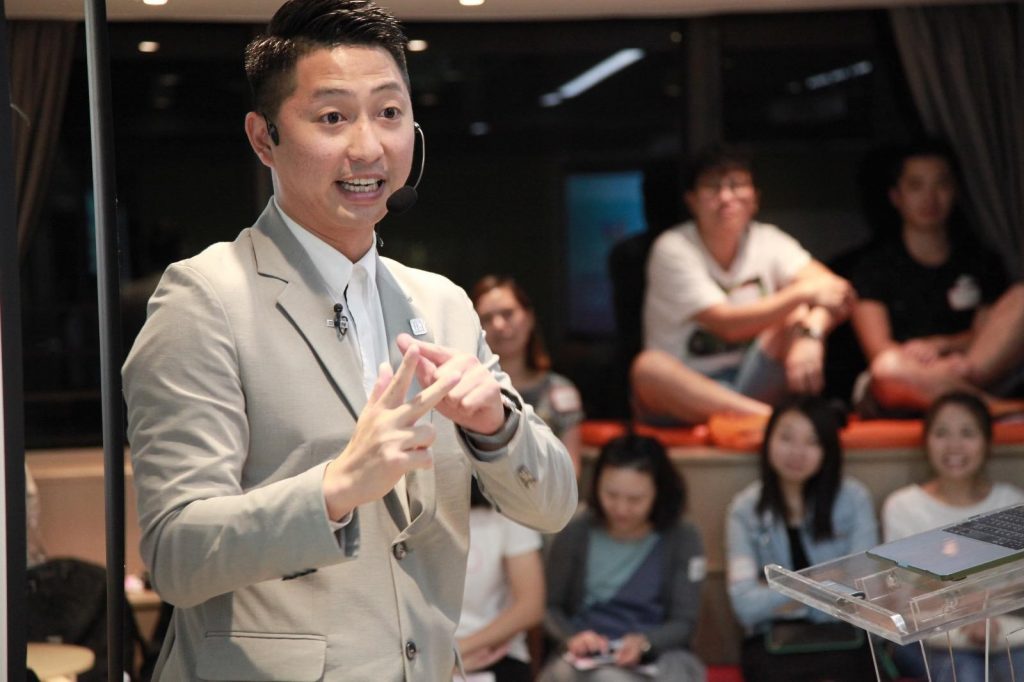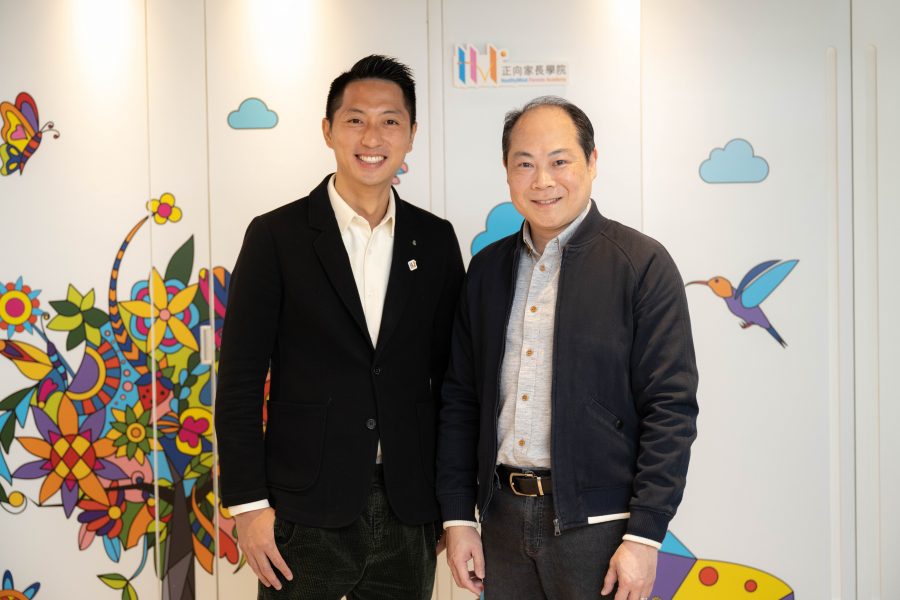Rex Wu, a psychological counsellor with over 20 years of experience, came across a piece of news in 2013 via the Hospital Authority channel stating that depression was estimated by the World Health Organization to be the second most common illness across the globe by 2020. Rex was aware of the lack of professionals at hand to solve the issue, hence founded the HealthyMind Parents Academy to mitigate the impacts of depression and improve mental health in families via parent education.
Through children, parents discover their real selves
Rex explains why he has identified parent education as a solution: “We focus on parents because they are easily motivated to seek self-improvements. When parents interact with their children, it is very likely that they would get a glimpse of an authentic, never-before-seen side of themselves. Unlike dealing with a spouse in which we are aware of each other’s blind spots and flaws, and are willing to make the marriage work by being tolerant and accommodating, dealing with children can easily trigger parents as their forthright manner may unveil parents’ strengths and weaknesses. Through their children, parents are likely to discover a side of them that nobody – not even themselves – knew about. Positive psychology studies have shown that parents’ personalities and parenting methods have a 90% impact on their children’s happiness and sense of well-being. If we render support to parents, we can improve both their happiness and that of future generations. Positive parent education, therefore, is an essential and effective way to cultivate good mental health.”
The KASH journey
The HealthyMind Parents Academy uses a formula named KASH. Rex explains, “K is for knowledge: most parents are not familiar with children’s cognitive development, so they resort to the same parenting methods that their parents had used. This results in misunderstanding and unnecessary conflicts. A is for attitude: good parenting does not come with the birth of a child. Do you have unwanted thoughts that stem from your original family? Are you certain about your role as a parent? S is for skill: the same words can carry various meanings when communicated differently. When children are throwing a tantrum, what techniques can we use to resolve the situation step by step? What is considered a concrete compliment? How do we nurture happy children? All these require techniques.”
“Only when parents apply the first three acronyms of K, A and S would they enter the last stage – H, for habit. Happy parents raise happy children. By introducing the KASH formula to parents, we do not call our programme a “course” but a “journey”. As parenthood is a lifelong commitment, change is not a one-off event – you may find it easy on one day, but struggle on the other. We are ready to accompany parents as they pursue the path to growth.”

So how does the journey begin? Rex says, “We discuss eight topics in a span of eight weeks. We start with psychology concepts like the stages of mental and cognitive development in children plus how the brain changes at each stage. With these theories, parents can better understand and embrace their children’s personalities. Then, we help parents establish their roles with questions like: how do parents, both individually and together, affect their children’s personalities? What makes each parent unique? Each parenting style, be it authoritarian, permissive or authoritative, generates a specific result. Next, we cultivate parents’ problem-solving skills so they can teach their children as well. Last but not least, parents would learn emotion management. This is particularly important for Chinese parents as Chinese people are usually not well-versed in expressing emotions, not to mention it is not uncommon to be blamed for having and showing emotions.”
It is never too late to foster good relationships
While some parents worry their decaying relationship with their children is irreversible due to previous poor parenting methods, Rex believes the term “too late” is non-existent in psychology. “No matter how old your children are, it is never too late to be a good parent. Psychologist Erik Erikson divided mental development into three stages: childhood (from zero to 12 years old), adolescence (from 12 to 20 years old) and adulthood (from 20 years old). What we do at the HealthyMind Parents Academy is to change the way parents think and feel about children’s behaviours. According to Erikson, children start to develop autonomy from one to three years old. During this time, they tend to be opinionated and like to reject others for no good reason, which often result in tantrums as their brains have yet to grasp logic. Parents may describe children of this stage as ‘trouble two’ and get frustrated whenever they throw a tantrum. Yet, if they could understand that children’s unreasonable rejections actually reflect a lack of logical reasoning, parents would not feel as tense. On the other hand, parents should guide children towards making the right choices rather than offering them full autonomy to prevent them from becoming self-centred bullies. Draw boundaries for children and grant them freedom within such boundaries would help children learn discipline while at the same time, develop autonomy and enjoy a harmonious relationship with their parents.”

Ringle Leung, CEO of the HealthyMind Parents Academy, shares, “For 10 years of my childhood, my busy parents sent me to a childcare centre, where I learnt to be independent, on the expense of my relationship with my parents and my ability to build trust and intimacy with others. I started working when I was around 24 years old, and encountered Rex, my psychology teacher, who inspired me to better understand myself. When Rex and I crossed paths again in 2015, I already had my own family. He asked me what I wanted to do in the future, and whether I would consider giving back to society. I am among the many who have been able to benefit from the study of psychology and bring positive changes to our lives. Based on the solid assumption that all parents in Hong Kong love their children, I wonder why we still see so many people suffering from poor parent-child relationships, just like what I had with my parents. It was with the purpose of breaking the vicious cycle that I decided to join the HealthyMind Parents Academy.”
You are tired because you are making effort in the wrong direction
“Albeit a taxing 2020 and the pandemic, my motivation comes from the parents I meet and our weekly live streams, as our 15-minute sharing sessions could perhaps save a family. Parents sometimes ask, ‘Why are my children behaving this way?’ The right question to ask, however, is whether their children feel happy with or dejected from their parents. Unhappy children who are often criticized by their parents tend to be more vulnerable to external factors. Children who realize that their family is their safe haven are more hopeful and willing to give back. To the parents who always complain about how busy and exhausted they are, I would tell them that they feel tired only because they are making effort in the wrong direction. Despite giving their best, they still find themselves being unappreciated by their children, thus in turn makes them feel frustrated. This will totally change when parents are able to build a positive relationship with their children – parents will feel recharged at home as the love from their spouse and children will become their shield against the world beyond, much like how oxytocin reduces stress.”
Rex and Ringle are concerned about the recent student suicide cases. Ringle says, “We have not been able to keep up with depression and emotional distress among teenagers: suicide rates among young people remains as the top three in Hong Kong. It is our goal to raise public awareness and encourage more people to lend a helping hand, via organizing on-campus parenting seminars at schools and forming a non-profit organization to support grassroots families.” Rex adds, “The divorce rate in Hong Kong is 48%; more than 170 students have committed suicide since 2015; research by the Baptist Oi Kwan Social Service reveals that more than 50% teenagers are depressed; and Hong Kong is ranked eighth among 10 countries or regions in an interpersonal relationship research. All this data shows that while Hong Kongers are seemingly happy, boast good language skills and enjoy a flourishing economy, our intrapersonal, marital and parent-child relationships are suffering. When people enjoy better education, career achievements and financial stabilities, they become increasingly self-centred, resulting in blatant oversight of important aspects in their lives. A Harvard research points out that quality relationships are the key to happiness. Therefore, we strive to educate parents on building parent-child, marital, intrapersonal and interpersonal relationships, with the hope that they will pass on this healthy legacy for generations to come.”
~ Helena Hui

